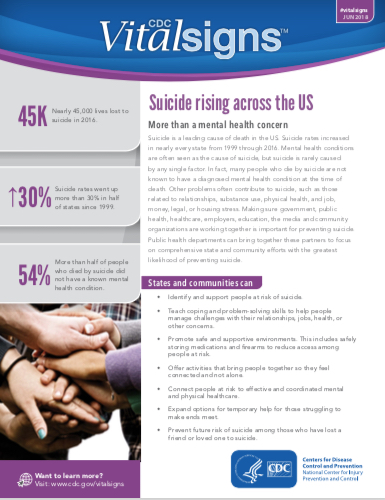
Scott T. Aaronson, MD
Director, Clinical Research Programs
Sheppard Pratt Health System
During this Mental Health Awareness Month, we spoke with Dr. Scott Aaronson about where we are with care for mood disorders and what we have to look forward to.
Care for Your Mind (CFYM): Health care continues to be divided into above the neck and below the neck (mental health separate from physical health). What do you see down the road?
Scott T. Aaronson, MD: We’re in the process of enlarging the scope of what we consider to affect mental health. We know, for example, that psychiatric illnesses are often accompanied by inflammatory conditions, which has led to research in the area of psychoimmunology. There is also evidence regarding the interrelationship between the gut biome and mental health issues, such as early indications that including probiotics in treatment for mania results in fewer hospital readmissions. Research is challenging what people used to believe was a bright line to distinguish mental health care from physical health care. We should recognize mental health conditions as “total body illnesses.” The mind and body are neither separate nor separable.
CFYM: Perhaps we have recognized, in part, that there is no clear separation, given that we rely so heavily on primary care providers (PCPs) to diagnose and treat mood disorders.
Dr. Aaronson: Primary care providers are essential for the first line of treatment. People often turn to their PCPs when they are affected by mental health issues. Frequently, people are looking for help with somatic symptoms, such as headaches, digestive issues, and problems sleeping. Many people don’t know that they are experiencing symptoms of a mood disorder, or they might not want to acknowledge a mental health issue. There is a shortage of mental health providers and in many areas they’re just not readily available. And, as we discussed, these are total body illnesses that require total body care.
On the other hand, we haven’t come far in educating PCPs about treating depression. PCPs need training and time to administer and correctly interpret depression screening tools, and insurance should cover – if not incentivize – those screenings. Although PCPs write nearly three-quarters of all antidepressant prescriptions, they need to be conscientious about referring people to mental health specialists (particularly those who can write prescriptions) when a person has a complicated case of depression, may have bipolar disorder, psychotic symptoms, suicidal thoughts, or has not improved with two courses of antidepressant treatment. PCPs should also refer patients to therapy, to enhance the likelihood of treatment success. (Of course, we still need to better define what constitutes success in treatment.)
Insurers rely too heavily on PCPs with regard to diagnosing and treating mood disorders. The short-term cost of a visit to a PCP versus a psychiatrist might seem to justify this approach, but the long-term cost of care – not to mention the burden on the patient as well as her or his family – when mood disorders are not effectively treated is far greater. We should invest in the proper level of care and the appropriate treatment as needed by the patient.
CFYM: In addition to patient-centered care as positively affecting treatment, CFYM has covered the benefits of family involvement and shared decision making. What are you seeing with these aspects of care?
Dr. Aaronson: Well, all three are important. Patient-centered care should lead to the outcomes that matter to patients. Shared decision making is a great idea and would ideally be much more a part of practice. Honestly, though, it takes a lot of time. As a consulting specialist, I can spend more time than the usual mental health clinician educating patients and their families about their disorders and their treatment options. As for family involvement, in a difficult assessment, collateral information is critical. Patients may not always recognize all their symptoms and an outside observer can be uniquely helpful. Mental health is affected by family function and family problems, so involving families in treatment – especially in family therapy – can strongly support not only positive outcomes but better relationships and better mental and physical health for all involved. Family caregivers are often the drivers behind seeking care and adhering to treatment, both necessary for a return to mental wellness.
Next week: The interview with Dr. Aaronson continues, focusing on potential new treatments.
Your Turn
- How do your providers manage your total body health? What would you like them to do?
- In what ways has your primary care provider been helpful about your mental health issues, and what do you wish she or he had done?
- What could your providers do to make you feel more involved in your mental health care?
Bio
Scott T. Aaronson, MD, is Director of Clinical Research Programs at Sheppard Pratt Health System in Baltimore, Maryland. He has been particularly involved with the development of new strategies to alleviate the symptoms in treatment resistant mood disorders. Dr. Aaronson earned his medical degree with honors from Harvard Medical School and completed a residency in psychiatry at McLean Hospital in Belmont, MA. He is a Clinical Associate Professor of Psychiatry at the University of Maryland, School of Medicine.
Dr. Aaronson provides expert consultation across the system of care for patients with difficult to treat mood and psychotic disorders. He has published numerous articles on his research including pivotal studies in the use of devices – Transcranial Magnetic Stimulation (TMS) and Vagus Nerve Stimulation (VNS) – in the treatment of severe refractory mood disorders.
Dr. Aaronson is board-certified in Psychiatry and he is a member of several professional organizations, including Distinguished Fellowship in the American Psychiatric Association and the Maryland Psychiatric Society, for which he served as President. He is also a fellow of the American College of Psychiatrists.








Connect With Us